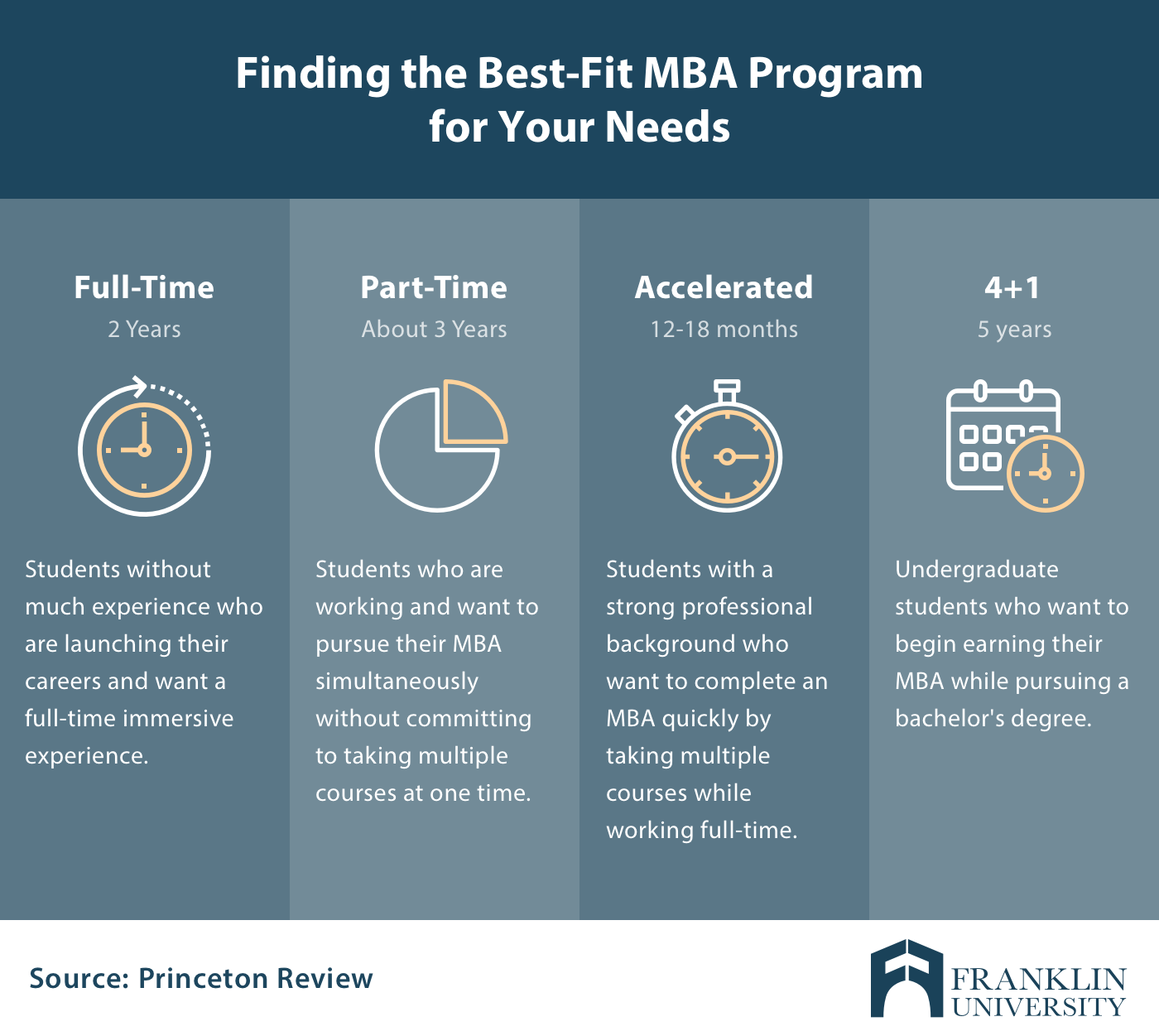In today’s competitive business landscape, professionals seek advanced degrees to enhance their skills, knowledge, and career prospects. Among these, the Master of Business Administration (MBA) stands as a highly coveted credential. For aspiring MBA candidates, one of the primary concerns is the time commitment required to complete the program. The duration of an MBA program can vary depending on several factors, including the type of program, institution, and individual circumstances. This article delves into the details of how long it takes to earn an MBA, exploring different program formats, course loads, and factors that influence the completion timeline.
MBA Program Duration: Factors Influencing Your Timeline
Full-Time MBA Programs
Full-time MBA programs are the most common and typically take two years to complete. This format allows students to immerse themselves in their studies and develop a strong network with classmates.
| Program Type | Duration |
|---|---|
| Full-time MBA | 2 years |
Part-Time MBA Programs
Part-time MBA programs are designed for working professionals who want to earn their degree while maintaining their careers. These programs can take three to five years to complete, depending on the program’s structure and the student’s pace.
| Program Type | Duration |
|---|---|
| Part-time MBA | 3-5 years |
Executive MBA Programs
Executive MBA programs are geared towards experienced professionals who have already achieved a significant level of success in their careers. These programs often involve intensive coursework and can take 18 months to two years to complete.
| Program Type | Duration |
|---|---|
| Executive MBA | 18 months – 2 years |
How quickly can you get an MBA?

How Quickly Can You Get an MBA?
The time it takes to earn an MBA varies depending on several factors, including the program type, your prior education and work experience, and the pace at which you choose to study. Here’s a breakdown of common MBA program durations:
Full-Time MBA Programs
Full-time MBA programs are the most traditional and typically take two years to complete. These programs are intensive and involve a demanding course load, often requiring students to relocate to the campus location.
- Immersive learning experience: Full-time programs offer a highly immersive experience, allowing students to focus solely on their studies and engage in a vibrant community of peers.
- Accelerated track: Some schools offer accelerated full-time MBA programs, which can be completed in 18 months or even 12 months. These programs often feature a condensed curriculum and require a higher level of commitment.
- Career advancement: Full-time programs are ideal for those seeking a significant career change or wanting to gain specialized knowledge in a particular industry.
Part-Time MBA Programs
Part-time MBA programs offer more flexibility for working professionals. These programs can be completed in two to five years, depending on the program’s structure and the student’s pace.
- Balance work and studies: Part-time programs allow students to maintain their careers while pursuing an MBA, providing a gradual learning experience.
- Flexibility: Many part-time programs offer evening or weekend classes, allowing students to fit their studies into their schedules.
- Networking opportunities: Part-time programs often have a strong alumni network, providing valuable connections for career advancement.
Online MBA Programs
Online MBA programs offer the convenience of learning from anywhere at any time. These programs typically take two to three years to complete, but some accelerated options may be available.
- Flexibility: Online programs provide unparalleled flexibility, allowing students to study at their own pace and on their own schedule.
- Accessibility: Online programs make an MBA accessible to individuals who might not be able to relocate for a traditional program or have limited time availability.
- Cost-effective: Online programs often have lower tuition fees than traditional programs.
Is it worth it to get a MBA?

Is it worth it to get an MBA?
The decision of whether or not to pursue an MBA is a highly personal one that depends on your individual circumstances, career goals, and financial situation. There is no one-size-fits-all answer, but there are several factors to consider:
Career Advancement
An MBA can be a valuable asset for career advancement, particularly in certain industries.
- Higher earning potential: MBA graduates often earn significantly more than those with only a bachelor’s degree, particularly in senior management roles.
- Improved job opportunities: An MBA can open doors to new career opportunities and provide a competitive edge in the job market.
- Enhanced skills and knowledge: MBA programs equip students with a broad range of business skills, including finance, marketing, strategy, and leadership, that can be valuable in any career.
Network and Connections
An MBA program can provide access to a valuable network of peers, faculty, and alumni.
- Networking opportunities: MBA programs offer opportunities to connect with classmates, faculty, and alumni who can provide valuable career guidance and support.
- Industry connections: MBA programs often have strong relationships with industry leaders, which can lead to internships, job opportunities, and mentorship.
- Lifelong network: The connections made in an MBA program can last a lifetime, providing valuable support and resources throughout your career.
Personal Growth
An MBA can be a challenging and rewarding experience that can contribute to personal growth.
- Leadership development: MBA programs focus on developing leadership skills, including communication, decision-making, and team building.
- Critical thinking and problem-solving: MBA programs encourage students to think critically and develop creative solutions to complex business problems.
- Personal and professional growth: The rigorous curriculum and demanding workload of an MBA program can help individuals to develop their personal and professional capabilities.
Is it hard getting an MBA?

It depends on several factors, including your prior academic background, work experience, and the specific program you choose. However, in general, earning an MBA is a challenging and demanding endeavor.
Rigorous coursework and demanding workload
MBA programs are known for their rigorous coursework and demanding workload. Students will typically face challenging classes in finance, accounting, marketing, strategy, and other business disciplines. These classes often involve complex concepts, challenging assignments, and demanding deadlines.
Here are some common challenges:
- High volume of reading and writing: Expect to read and write a significant amount for each course.
- Complex concepts and theories: You’ll be studying advanced business concepts and theories that can be challenging to grasp.
- Demanding deadlines: MBA programs often have a fast-paced schedule with multiple deadlines and assignments.
Time commitment and sacrifice
Earning an MBA requires a significant time commitment. Full-time programs typically involve a two-year commitment, while part-time programs can take longer. This means that you will need to make sacrifices in your personal life and career to dedicate the necessary time and energy to your studies.
Here’s how an MBA can impact your life:
- Limited free time: You’ll have less free time for hobbies, family, and social activities.
- Potential career disruption: A full-time program may require you to take a leave of absence from your current job.
- Financial commitment: MBA programs can be expensive, so you’ll need to consider the cost of tuition, fees, and living expenses.
Competition and selectivity
Many top-tier MBA programs are highly selective and competitive. Admission committees seek applicants with strong academic credentials, professional experience, and leadership potential.
Here are some challenges related to competition and selectivity:
- Strong competition: You’ll be competing with other highly qualified applicants.
- Rigorous admissions process: The admissions process typically involves standardized tests (GMAT or GRE), essays, interviews, and references.
- High standards for admission: Admissions committees have high expectations for applicants’ academic performance, work experience, and extracurricular activities.
Which MBA has highest salary?
What are the highest-paying MBA programs?
It’s difficult to pinpoint a single MBA program with the absolutehighest salary potential, as numerous factors influence a graduate’s earning power. However, certain programs consistently rank among the highest-paying due to their renowned faculty, industry connections, and alumni networks. These programs typically specialize in areas like finance, consulting, and technology, where demand for skilled professionals remains high.
Factors influencing MBA salary potential:
- Program Reputation: Highly ranked programs with strong industry reputations attract top-tier employers, leading to competitive salaries.
- Specialization: Finance, consulting, and technology remain high-paying fields, with MBA graduates often commanding significant salaries.
- Prior Work Experience: Strong work history before entering an MBA program can increase earning potential.
- Career Goals: Focus on specific career paths within high-demand industries can lead to better salary outcomes.
- Networking Opportunities: Strong alumni networks and industry connections can provide valuable career support and opportunities.
Top MBA programs with high salary potential:
- Stanford Graduate School of Business
- Harvard Business School
- University of Pennsylvania (Wharton)
- University of Chicago (Booth)
- MIT Sloan School of Management
- Columbia Business School
- Northwestern University (Kellogg)
- Yale School of Management
- University of California, Berkeley (Haas)
- University of Michigan (Ross)
Frequently Asked Questions
How long does it take to get an MBA?
The length of time it takes to complete an MBA program can vary depending on several factors, including the program format, your prior education, and your chosen specialization. Most full-time MBA programs are two years long, requiring students to take 60-70 credit hours. However, part-time MBA programs can take 3-5 years to complete, allowing students to work and study simultaneously. Additionally, some programs offer accelerated options, enabling students to finish in 12-18 months. It’s important to research individual program lengths and consider your own circumstances to determine the best fit.
What factors affect the duration of an MBA program?
Several factors can influence the length of an MBA program:
Program Format: Full-time programs typically take two years, while part-time programs can extend to three to five years.
Prior Education: Students with an undergraduate degree in business may be able to complete the program faster due to course exemptions.
Specialization: Some specializations, like finance or healthcare administration, may have specific requirements that could impact program duration.
Course Load: Students can choose to take a heavier course load, potentially reducing program length.
Internship Requirements: Some programs require internships, which may add to the overall program time.
Program Structure: Some programs offer accelerated options or flexible scheduling, impacting the completion time.
Personal Circumstances: Factors like work commitments, family responsibilities, and travel can influence the time it takes to complete the program.
Can I complete an MBA in less than two years?
Yes, you can potentially complete an MBA in less than two years, but it depends on the program and your circumstances. Some programs offer accelerated options, allowing students to finish in 12-18 months. These programs often require a higher course load and may have limited flexibility. It’s essential to carefully consider your work and personal commitments before choosing an accelerated program. If you have a strong background in business and are willing to commit to a demanding schedule, an accelerated MBA may be a viable option for you.
What are the benefits of a longer MBA program?
While a shorter MBA program may seem attractive, a longer program can offer several benefits:
More Flexibility: Longer programs provide more flexibility in scheduling, allowing students to work and study simultaneously.
Reduced Course Load: A longer program allows for a lighter course load, which can be beneficial for working professionals or those with other commitments.
Greater Learning Depth: A longer program allows for greater exploration of business concepts and provides more opportunities for in-depth learning.
More Networking Opportunities: Longer programs offer more time for networking and building relationships with peers and faculty.
Better Work-Life Balance: A longer program allows for better work-life balance, making it easier to manage personal responsibilities alongside studies.
How long does it take to get an MBA?
The length of time it takes to complete an MBA program can vary depending on several factors, including the program format, your prior education, and your chosen specialization. Most full-time MBA programs are two years long, requiring students to take 60-70 credit hours. However, part-time MBA programs can take 3-5 years to complete, allowing students to work and study simultaneously. Additionally, some programs offer accelerated options, enabling students to finish in 12-18 months. It’s important to research individual program lengths and consider your own circumstances to determine the best fit.
What factors affect the duration of an MBA program?
Several factors can influence the length of an MBA program:
Program Format: Full-time programs typically take two years, while part-time programs can extend to three to five years.
Prior Education: Students with an undergraduate degree in business may be able to complete the program faster due to course exemptions.
Specialization: Some specializations, like finance or healthcare administration, may have specific requirements that could impact program duration.
Course Load: Students can choose to take a heavier course load, potentially reducing program length.
Internship Requirements: Some programs require internships, which may add to the overall program time.
Program Structure: Some programs offer accelerated options or flexible scheduling, impacting the completion time.
Personal Circumstances: Factors like work commitments, family responsibilities, and travel can influence the time it takes to complete the program.
Can I complete an MBA in less than two years?
Yes, you can potentially complete an MBA in less than two years, but it depends on the program and your circumstances. Some programs offer accelerated options, allowing students to finish in 12-18 months. These programs often require a higher course load and may have limited flexibility. It’s essential to carefully consider your work and personal commitments before choosing an accelerated program. If you have a strong background in business and are willing to commit to a demanding schedule, an accelerated MBA may be a viable option for you.
What are the benefits of a longer MBA program?
While a shorter MBA program may seem attractive, a longer program can offer several benefits:
More Flexibility: Longer programs provide more flexibility in scheduling, allowing students to work and study simultaneously.
Reduced Course Load: A longer program allows for a lighter course load, which can be beneficial for working professionals or those with other commitments.
Greater Learning Depth: A longer program allows for greater exploration of business concepts and provides more opportunities for in-depth learning.
More Networking Opportunities: Longer programs offer more time for networking and building relationships with peers and faculty.
Better Work-Life Balance: A longer program allows for better work-life balance, making it easier to manage personal responsibilities alongside studies.



